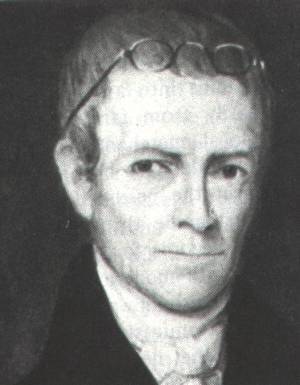
- Archibald Debow Murphey
- Born c. 1777 in Caswell County
- University of North Carolina Graduate
- Planter
- Lawyer
- State Senator
- NC Superior Court Judge
- Known as The Father of North Carolina Public Schools
- Died 1832
- Buried Hillsborough Old Town Cemetery
 Click on Photograph for Another Image
|
|
Archibald Debow Murphey was born around 1777 near Red House Presbyterian Church (a few miles from Milton) in that part of Orange County, North Carolina, that became Caswell County. His father, Archibald Murphey, was from Pennsylvania and a Revolutionary officer; and his mother, Jane Debow, was from New Jersey. He was one of seven children. The Archibald Murphey home place was on Hyco Creek.
After attending preparatory school in Greensboro (David Caldwell's famous "Log College"), Archibald Debow Murphey in 1796 entered the University of North Carolina, graduating with honors in 1799. After serviving as a professor at the University for several years, Murphey relocated to Hillsborough to study law with William Duffy. The year was 1801, the same in which he married Jane Armistead Scott, the daughter of John Scott of Alamance County. Before his marriage, Murphey purchased the Hermitage plantation from Jane Armistead Scott's father and established a formidable estate, including a separate building that Murphey used as his law offices.
During the first two decades of the 19th century, Murphey was active in business, legal, and political affairs. He made considerable investments in additional properties (often borrowing money to do so), had a vibrant and financially rewarding law practice, and served in the North Carolina State Senate 1812-1818 (representing Orange County).
Murphey probably is best know for his thoughts on education and internal improvements for North Carolina. In 1817, he submitted his legislative report recommending a publicly financed system of education. In 1819, he drafted a document recommending a program of internal improvements to build roads and to make rivers and canals navigable. Murphey's ideas were clearly ahead of the times and were ignored by his fellow legislators. In 1818, he was elected a superior court judge, but gave up the position after only two years to concentrate on his deteriorating financial condition and to compile a history of the State of North Carolina. He unfortunately, was unsuccessful in both endeavors.
While his state history was never written, lacking financial backing, he did amass papers and manuscripts that proved valuable to subsequent historians. Murphey was in chronic financial distress, having turned a comfortable financial position in 1812 into financial shambles by 1820. He was regularly overextended and unable to pay his debts. In 1829, he was imprisoned in Greensboro for twenty days because he could not pay a note when it became due. To some Murphey was no more than a dreamer who could not manage his own finances. However, to others he was a visionary. The following by H. G. Jones is from Dictionary of North Carolina Biography, Vol. 4 L-O, William S. Powell, Editor (1991) at 346:
Archibald D. Murphey's vision of the future surpassed that of his generation. Measured only against his contemporaries, he was an apparent failure, for few of his proposals were immediately carried out. However, his agitation for public education helped bring about the establishment of the State Literary Fund in 1825 and the first public school act seven years after his death. His zeal for the preservation of the history of the state infected others such as David L. Swain and John H. Wheeler, and the materials that he had collected are still used a century and a half later. And his proposals for overland and water transportation, though somewhat outdated with the coming of railroads, continued to emphasize the need for North Carolina to cast off its dependence on Virginia and South Carolina for markets. Thus, Murphey was far more than a dreamer. He was, indeed, a prophet of an awakened state.
On February 1, 1832, Archibald Debow Murphey died. He is buried at the Presbyterian Church in Hillsborough, North Carolina. Several schools in Caswell and Orange counties were named in his honor, as was Murphey Hall at the University of North Carolina. He was a distinguished citizen who cared deeply about the future of his state.